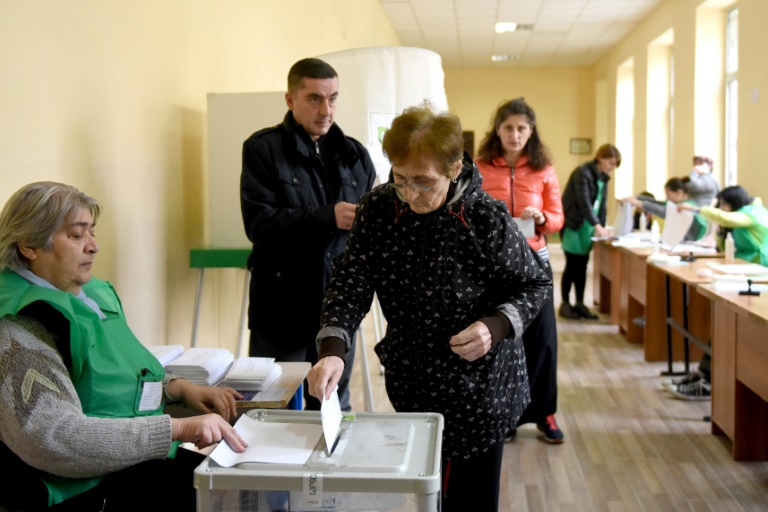
Georgians on Sunday went to the polls to elect a figurehead president in a vote seen as a crucial test for the increasingly unpopular ruling party.
The hotly-contested race pits ex-French ambassador and Georgia's former foreign minister Salome Zurabishvili, supported by the ruling Georgian Dream party, against opposition leader Grigol Vashadze, also a former foreign minister.
The two have an almost equal chance of being elected, but neither is expected to get the necessary 50 percent plus one vote to win in the first round, according to opinion polls conducted in the run-up.
Turnout stood at nearly 16 percent by noon (0800 GMT), central election commission said.
"I want a woman to become Georgia's president," Liza Mikeladze, a 59-year-old voter, told AFP at a polling station in central Tbilisi after casting a ballot for Zurabishvili.
Another voter, 28-year old IT specialist Niko Shelia, said that he "voted for Vashadze because a chance must be given to the opposition, because Georgian Dream's rule proved a nightmare."
Vashadze -- backed by exiled ex-president Mikheil Saakashvili's United National Movement (UNM) and 10 other opposition groups -- has been boosted by growing popular discontent over the government's failure to tackle poverty.
Over a fraught campaign Vashadze criticised the "informal oligarch rule" of Bidzina Ivanishvili, the billionaire leader of the Georgian Dream party.
Georgia's richest man, Ivanishvili stepped down as premier in 2013 after just a year in office, but is still widely believed to rule the country of 4.5 million people from behind the scenes.
On the campaign trail, Zurabishvili and Georgian Dream have slammed the UNM for alleged human rights abuses during its previous stretch in power.
The presidential campaign saw the ruling party and the opposition cross arms in a prelude to their decisive stand-off during parliamentary polls scheduled for 2020, analysts said.
"The camp that wins the presidential vote gets an upper hand in the parliamentary election," said analyst Ghia Nodia.
If elected, Vashadze has promised to mount a campaign demanding snap parliamentary polls.
- Rival diplomats –
Zurabishvili, a stylish 66-year-old independent MP, is the daughter of refugees who fled Georgia in 1921 for Paris after the country's annexation by the Red Army.
Her career in France's foreign ministry culminated in her posting to Tbilisi.
From that position Saakashvili appointed her foreign minister -- after approving the move with then French leader Jacques Chirac.
But she quickly made enemies in the ranks of the parliamentary majority, with MPs and a number of senior diplomats publicly accused her of arrogance and impulsivity.
She was sacked after a year on the job, though thousands took to the streets of the capital to protest her dismissal.
She then joined the opposition and became one of Saakashvili's fiercest critics.
Her main rival Vashadze is a respected career diplomat who served in the Soviet foreign ministry where he helped craft the Soviet-US treaty on the reduction and limitation of strategic offensive arms.
The 60-year-old was Saakashvili's foreign minister from 2008-2012.
Vashadze is married to the world-renowned prima ballerina Nina Ananiashvili, who has been described in the foreign press as one of the greatest ballet dancers of all time.
Both candidates have promised to bring Georgia closer to full membership of the European Union and NATO.
The tiny Black Sea nation has knocked on NATO's doors for more than a decade but the bloc has not yet put Tbilisi on a formal membership path, despite a pledge in 2008 that it will at some point be admitted to the club.
The vote is Georgia's last direct leadership poll as it transitions to a parliamentary form of governance following a constitutional reform. After inauguration, the new head of state will be a largely ceremonial figure.
Georgia's next president will be elected in 2024 by a 300-member electoral college.
Over 3.5 million people are eligible to vote in the election, which will be monitored by international observers from the Organisation for Security and Cooperation in Europe.
If the vote goes to a run-off, a second round will be held by December 1.
Polls will close at 1600 GMT with results expected to start coming in overnight.


